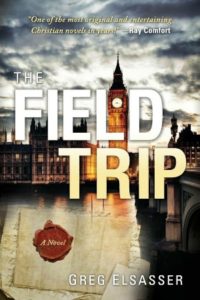An anti-conspiratorialist is forced to confront his beliefs–and his skewed understanding of forgiveness. Author Greg Elsasser talks about his suspense novel The Field Trip (Genesis Publishing Group). In this Q&A, Greg shares the inspiration behind The Field Trip, explains the most challenging part of writing the novel, and how he “casts” the characters in his fiction.
I think a great Christian novel can contain a strong, distinct gospel message and be extremely entertaining at the same time. I think The Field Trip does both.
– Greg Elsasser
WHAT WAS THE INSPIRATION DRIVING THE STORY IN THE FIELD TRIP?
 As a high school English teacher, I’ve been taking Europe trips with my students off and on for years, and I’ve often thought about what I would do, as the leader, if something happened that resulted in my losing the entire group. That was the seed “thought” that led to the basic premise of the novel. I also went through a period where I was reading a lot of Christian apocalyptic works and several books on conspiracy theories. The plot took off on its own from there.
As a high school English teacher, I’ve been taking Europe trips with my students off and on for years, and I’ve often thought about what I would do, as the leader, if something happened that resulted in my losing the entire group. That was the seed “thought” that led to the basic premise of the novel. I also went through a period where I was reading a lot of Christian apocalyptic works and several books on conspiracy theories. The plot took off on its own from there.
WHAT ARE THE CHALLENGES OF WRITING A CHRISTIAN NOVEL THAT’S ALSO A CRIME STORY?
Well, in order to have conflict in any story, people are going to do some bad things, and there are some people doing some very bad things in The Field Trip. Now, the violence in the book is certainly not excessive, but in order to engage the reader, there is no way around it: in a suspense thriller, characters’ lives must be in jeopardy.
WHAT WAS THE MOST CHALLENGING PART OF WRITING THE NOVEL?
The challenge proved to be in the time it took to actually complete the writing. I had no idea how many hundreds of hours would go into The Field Trip. In the past I’ve completed screenplays, stage plays, short stories, and TV pilots, but nothing compared to the sheer amount of work that I ended up putting into one 400-page story.
DO YOU BASE YOUR CHARACTERS ON PEOPLE YOU KNOW–OR ARE THEY TOTALLY MADE UP?
 Some characters are composites of the many people in my life. The two main high school students, Eddie and Bryant, are amalgams of the various students that have walked through my classroom doors in the last twenty-five years. Now, I do often name characters after the real people in my life—but I always have to let my friends and family know that their namesakes aren’t necessarily a reflection on my thoughts of them as an actual person!
Some characters are composites of the many people in my life. The two main high school students, Eddie and Bryant, are amalgams of the various students that have walked through my classroom doors in the last twenty-five years. Now, I do often name characters after the real people in my life—but I always have to let my friends and family know that their namesakes aren’t necessarily a reflection on my thoughts of them as an actual person!
Also, in my head, I also conduct a mini-“casting” call when creating characters for the first time. I cast real working actors in most of the larger roles, and this process helps me visualize facial expressions, quirks, individual style, etc. For some reason, I find this to be one of the most fun and satisfying parts of the writing, and I always challenge people to figure out what famous actor they think I’ve envisioned for certain characters.
WHAT DO YOU WANT THE READER TO TAKE AWAY AFTER READING THE FIELD TRIP?
I want all readers to walk away from The Field Trip with a clear understanding of the gospel. Some time ago, I got to a point in my writing career when I decided I would no longer write any type of fiction without a clear gospel presentation integrated somewhere in the story. Now, The Field Trip is no doubt a fun, thrilling, and humorous read, but if the reader walks away from the book having just been amused for a couple of days, I know I would feel strongly that I haven’t done my job as an ambassador for Christ.
I think a great Christian novel can contain a strong, distinct gospel message and be extremely entertaining at the same time. I think The Field Trip does both.
More about the book here:


